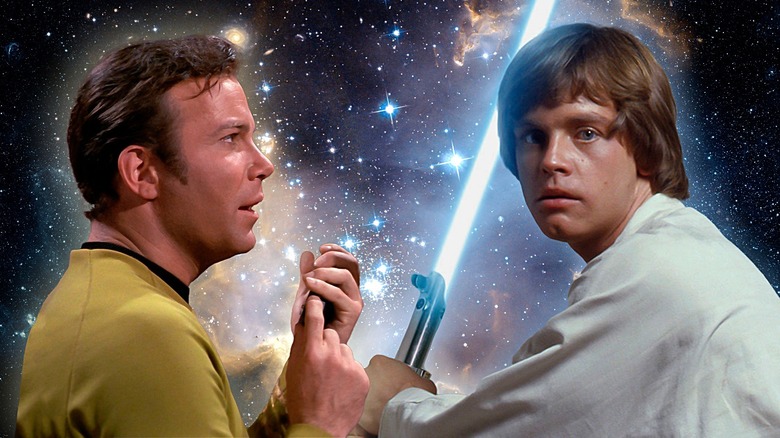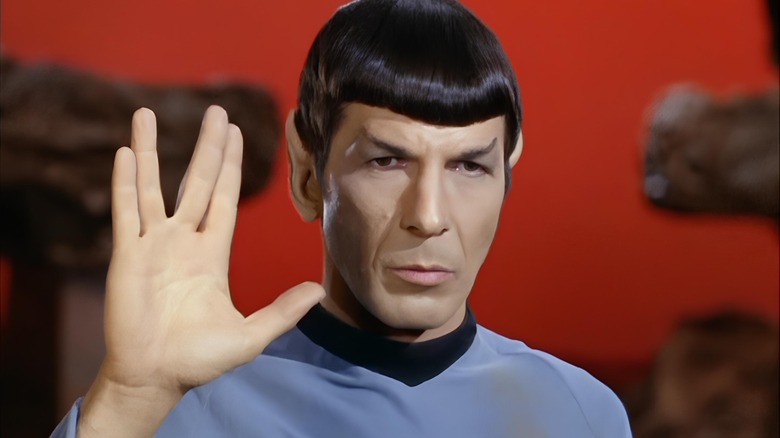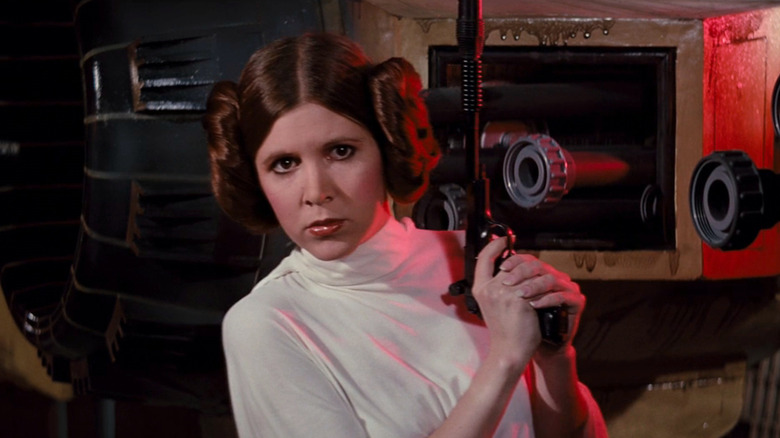Star Wars Vs. Star Trek: Which Came First (And Why Does It Matter)?
The two most impactful science fiction franchises of the 20th century, "Star Wars" and "Star Trek," have inspired generations of fans while managing to remain at the top of modern pop culture. From hyperdrive to warp drive and Rebels to Starfleet, they've saturated the public consciousness with their characters and iconography like few other properties in the media landscape. But as both continue to create new material in the 2020s and their original release dates fade into history, many people have asked: which came first, "Star Wars" or "Star Trek"?
While "Star Wars: Episode IV – A New Hope," opened on May 25, 1977, "Star Trek: The Original Series" premiered on NBC over a decade prior, with its first episode, "The Man Trap," airing on September 8, 1966. That timeline might lead some to assume that "Star Wars" was influenced by "Star Trek," but despite both having "Star" in their titles, they are wildly different franchises.
"Star Trek" was first conceived of by creator Gene Roddenberry, who helmed both "Star Trek: The Original Series" and its spin-off "Star Trek: The Next Generation." Set in the 23rd century and beyond, episodes were focused on space exploration in a future where humanity had set aside its differences to venture among the stars. On the other hand, "Star Wars," created by auteur director George Lucas, is famously set "a long time ago, in a galaxy far, far away." Due to its Jedi Knights, Emperors, princesses, and space magic, it is often distinguished as science-fantasy rather than science-fiction.
Star Wars had several key influences other than Star Trek
There has been much debate over the degree to which "Star Trek" influenced the later "Star Wars," but while George Lucas and his team took some inspiration, it was minimal. Lucas was primarily inspired by real history and Japanese samurai films, while his science fiction influences were 1930s serials like "Buck Rogers" and "Flash Gordon." Lucas actually sought to license the latter property for a remake and embarked on "Star Wars" after he failed to secure the rights.
When it came to history, Lucas drew from the events of World War II and the Vietnam War. This influence is evident in the Nazi-like aesthetics of the Empire. At the same time, the plot involving a band of rebels fighting a mighty imperial power was based on Lucas' understanding of the Vietnam War. The Rebel Alliance, as Lucas told fellow director James Cameron, was based on the Vietcong communist fighters who opposed United States forces in Vietnam (via AMC+).
Meanwhile, with characters like Han Solo (Harrison Ford) created in the mold of action heroes, "Star Wars" aped the aforementioned pulp serials. Other elements, like Jedi and their lightsabers, were futuristic reinterpretations of work by Japanese director Akira Kurosawa, who was known for samurai films like "Seven Samurai."
Star Trek opened the door for Star Wars
The inspirations Gene Roddenberry drew on for "Star Trek" were quite different from those Lucas adopted for "Star Wars." While both franchises are, when boiled down, space Westerns, Roddenberry specifically cited television Westerns when he first pitched his series. As noted by Time in 2016, he called it a "'Wagon Train' to the stars," referencing a 1950s TV series about a wagon train exploring the American West.
While "Star Wars" has, since its inception, woven an epic tale of good versus evil, episodes of "Star Trek" are typically focused on untangling a moral conundrum. Often, there is no obvious villain present in the narrative, and the stakes rest on intellectually untangling a problem rather than fighting it head-on. When it came to politics, "Star Trek" was influenced by the Cold War, with Starfleet being allegorical to the United States and the Klingon Empire, mirroring perceptions of Russia and the Soviet Union.
However, George Lucas was known to be a big fan of "Star Trek," and Roddenberry's work did influence "Star Wars" to a certain degree. "'Star Trek' softened up the entertainment arena," Lucas said in the documentary "Trek Nation," "so that 'Star Wars' could come along and stand on its shoulders" (via Scott Colthorp on Vimeo). In other words, the success of "Star Trek" caused Hollywood executives to see the market potential of science-fiction stories set in outer space. Lucas attributes his ability to create "Star Wars" to that newfound receptiveness.
Both franchises are still going strong today, with new "Star Trek" series like "Star Trek: Strange New Worlds" and "Star Trek: Lower Decks" streaming on Paramount+. And while a new "Star Wars" film hasn't been released in a few years, new streaming series continue to emerge, most recently "The Mandalorian" and "Ahsoka."


